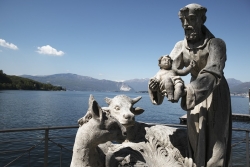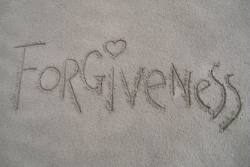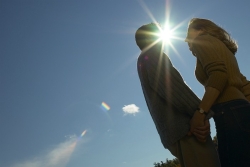Displaying 1 - 10 of 86
Delicious Recipes for Your Rosh HaShanah Meal
Whether you're feeding picky kids or vegan adults, ReformJudaism.org is here to help you plan the perfect menu for your holiday dinner.
Understanding the Significance of the Akeidah for Modern Jewish Thought
Aaron Koller is a professor of Near Eastern and Jewish studies at Yeshiva University and chair of the Department of Jewish Studies at Yeshiva College.
What’s Different about High Holidays Challah?
In Pirkei Avot, Rabbi Elazar ben Azariah taught, “If there is no bread, there is no Torah; and if there is no Torah, there is no bread.” I love these words. They echo in my mind when I partake in two of my favorite almost daily activities, the study of Torah and the baking bread. On the holidays, these two passions intersect, as they have for generations of Jews, when I shape challah. The traditional shapes for challot (plural) can be Torah study on our very festival tables.
How to Harness the Healing Power of Forgiveness and Repentance
So how does one begin the process of forgiveness?
Sylvester: To Celebrate or Not to Celebrate?
In North America, many Jews prepare for Rosh Rosh HaShanah, the Jewish new year, by making to-do lists: acquiring seats for High Holiday services, inviting guests, purchasing a new fruit, and preparing chicken soup just like Bubbe used to make.
At New Year's, We Can Revisit Rosh HaShanah Goals... and Try Again
On Rosh HaShanah, Jews traditionally throw pieces of bread into the water as a symbolic gesture of casting away our sins. The first of January can be a time to see which sins have have stayed away and which returned from their watery grave.
How Yoga's Wisdom Can Help Us Prepare for Elul
I often hear my yoga teachers' words when I embark on a new project or endeavor. Today, as we get ready to usher in the month of Elul, the preparatory month for the High Holidays, I keep thinking to myself: What is my intention?
T'shuvah: Returning to Our Truest Selves at the High Holidays
The central theme of the High Holiday season is t’shuvah (turn, response), an expression of hope that the way we are today need not be who we remain tomorrow.
7 Things to Know About Selichot
S’lichot, penitential prayers said before the High Holidays, offer us opportunities for personal reflection and to seek forgiveness from those we wronged during the year.
Taking a Hard Look at Our Relationships
The individual relationships we share are the backbone of creating a kehillah kedosha—a sacred community.









